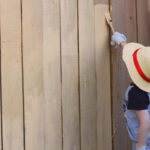The issue of whether a neighbor can build a fence on the property line is a common concern among homeowners. Property boundaries and the rights associated with them can be complex, and it is important to understand the legal principles and considerations that govern fence construction. In this blog, we will explore the topic of neighbors building fences on the property line and shed light on the rights and limitations that come into play.
Understanding Property Boundaries
To determine whether a neighbor can build a fence on the property line, it is crucial to establish the precise location of the property boundaries. Property boundaries are typically determined by property surveys conducted by professional surveyors. These surveys provide accurate measurements and legal descriptions of the property, defining where one property ends and another begins.
Shared Fence Ownership
In many cases, when a fence is built directly on the property line, it is considered shared or mutual property. Shared fence ownership means that both neighboring property owners have joint ownership and shared responsibilities for the fence. Each neighbor has a vested interest in the fence and is generally expected to contribute to its construction, maintenance, and repair.
Building Permits and Local Regulations
Before constructing a fence, it is essential to consult the local building codes and zoning regulations that govern fence construction in your area. These regulations often provide guidelines regarding fence height, setback distances, materials, and permits. Your neighbor may be required to obtain the necessary permits and adhere to the established rules when building a fence on the property line.
Boundary Agreements and Easements
In some cases, neighbors may enter into formal boundary agreements or easements to address fence construction on the property line. These agreements outline the rights, responsibilities, and financial arrangements related to the fence. By establishing clear expectations and boundaries, neighbors can navigate shared fence ownership and construction in a mutually agreeable manner.
Respecting Property Rights and Boundaries
It is essential to respect the property rights of your neighbor when considering fence construction. If your neighbor intends to build a fence on the property line without your agreement or against your wishes, it is advisable to consult legal professionals to understand your rights and options. They can provide guidance on local laws, property rights, and potential remedies available to you.
Disputes and Resolution
In situations where disputes arise regarding fence construction on the property line, open and respectful communication is vital. Engaging in a constructive dialogue with your neighbor can help clarify expectations, reach a mutual understanding, and potentially resolve the issue amicably. If necessary, seeking mediation or legal assistance can provide guidance in resolving disputes and reaching a fair resolution.
Whether a neighbor can build a fence on the property line depends on various factors, including shared fence ownership, local regulations, and property rights. Understanding property boundaries, consulting local regulations, and engaging in open communication with your neighbor are crucial steps in navigating fence construction issues. It is important to respect each other’s rights and work towards mutually agreeable solutions. In cases where disputes arise, seeking legal advice can help protect your interests and find a fair resolution. Remember, every situation is unique, and seeking professional guidance is key to understanding your rights and responsibilities when it comes to fence construction on the property line.







